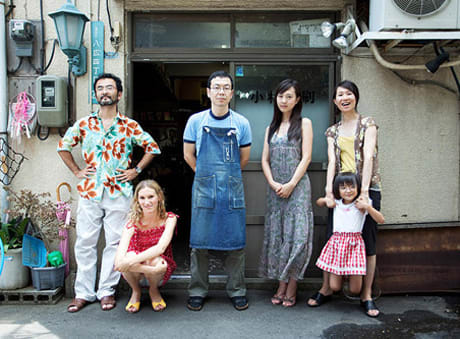Lying somewhere between a comedy of manners and tethered, surrealist absurdity, Koji Fukada's not-so-subtle social critique, Hospitalité, plays off a Japanese cultural tendency towards xenophobia in post-industrialist Japan. And like any good metaphorical text, this briskly paced tale of hospitality gone awry positions its politics in a vacuum of sorts, limited to the Kobayashi Printing Company, where the mild-mannered Mikio (Kenji Yamauchi) lives and works with his substantially younger wife, Natsuki (Kiki Sugino), and recently divorced sister, (Kumi Hyodo). Also heightening the exaggerated melancholia and displacement stemming from a broken traditional family unit is the inclusion of Mikio's daughter, Eriko (Erika Ono), from his estranged first wife. Amidst discussions about a fickle economic climate and resultant employment instability ― Mikio has had to downsize and adjust to employees that come and go ― the unfocused and misguided nature of studying abroad to find oneself also dominates thematically. Where the comedy comes from is in the unexpected arrival of the exceedingly confident and eventually confrontational Kagawa (Kanji Furutachi), who shows up claiming a past with Mikio's father. Taking a room upstairs from the print shop after accepting a job, Kagawa brings Bosnian (even though her accent suggests otherwise) wife Annabelle (Bryerly Long) to live with them despite not asking. What unfolds are a series of passive-aggressive comments and plays of social etiquettes, with Natsuki feeling discomforted by the addition of another young woman in her home. Eventually, secrets that Mikio and Natsuki's have been keeping from each other arise, giving Kagawa added leverage on his invasion, leading to additional "houseguests" and added compromises on the part of the hospitable homeowners. Even though the eventual chaotic climax is didactically murky, simultaneously criticising the dominant force of outsiders while embracing the free-spirited "in-the-moment" dynamic they bring to a lifeless and repressed situation (a theme visualized by the trajectory of a missing bird that has fled its cage), the strong core storytelling works unto itself. Fukada's subdued depiction of increasingly erratic comic shenanigans ensures that the eventual histrionics and character conflicts remain grounded within a realm of humanity. This sharp handling of potentially atonal material is oddly juxtaposed with the short film included with the DVD, Miyuki. During its 12-minute runtime, it details a Japanese girl studying in America going on a blind date with a man she met in the "Casual Encounters" section of a website. The conflict comes when her date realizes that she misinterpreted the meaning of "casual encounters" because of her minimal understanding of English. If there's a lesson, it's that Lavalife should really consider clarifying their naming conventions. It's unlikely anyone would be confused by a category called "Anonymous Sex."
(Film Movement)Hospitalité
Koji Fukada

BY Robert BellPublished Oct 4, 2012



